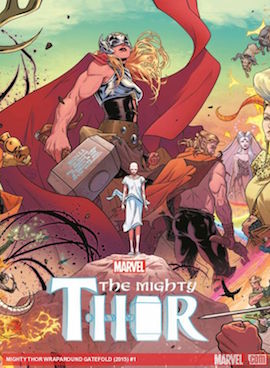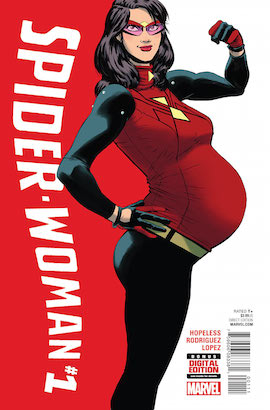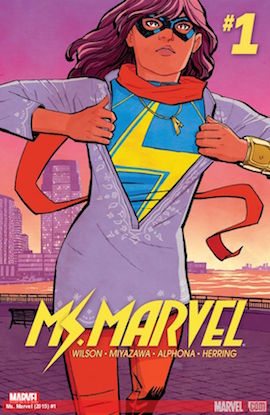In what could very possibly be some sort of a record, Marvel Comics this week published three first issues of three different series starring superheroes who are women. Even better, all three of them are great fun. They’re classic superhero comics; compelling stories about conflicted characters in outlandish situations.

The Mighty Thor #1 establishes the new status quo for the title: Jane Foster, the character best-known as Thor’s mortal girlfriend in the film series, controls the hammer (and the power) of Thor. But Foster has cancer, and the transformation into Thor is making her condition even worse. The script by Jason Aaron manages to skillfully combine exposition with fantastic elements — most notably, a rain of dead elf bodies in outer space. And Russell Dauterman’s artwork is fantastic; he renders both the realism of a chemotherapy infusion room and the fantasy of a space senate featuring trolls, elves, and creatures made entirely out of fire. The issue ends on a lazy superhero comics cliché —a splash page revealing a mystery villain, the same technique that
Aaron used in last week’s debut issue of The Goddamned — but it’s otherwise a wonderful introduction to an interesting new take on a character that had grown stale.

The first issue of Dennis Hopeless and Javier Rodriguez’s
Spider-Woman is, like
Thor, beautifully illustrated. Rodriguez’s art favors clarity above all else; his lines are slick and expressive, and he’s at his best when he densely populates a page, especially in one scene featuring a few dozen superheroes hanging out at a rooftop party to celebrate Spider-Woman’s maternity leave. Sometime between the end of the last
Spider-Woman series (which ended a few weeks ago but which in comics time took place eight months ago) and this issue, Spider-Woman became pregnant. Who’s the father? Nobody’s telling. (This is a gimmick DC Comics used a few years ago with Catwoman, too.) As a first issue, the story fails to explain an awful lot: why, in a world full of superheroes, is Spider-Woman training someone to replace her while she’s out on maternity leave? Why is reporter Ben Urich helping her? What’s Spider-Woman's mission, really? If you let those questionable motivations slide and just go along for the ride, you’ll have plenty of fun with pages packed with aliens and guest-stars and a book that considers the consequences of being a superhero while pregnant.

The first issue of
Ms. Marvel similarly takes place eight months after
last month’s concluding issue, although it very clearly picks up where the last issue took off: our hero, Kamala Khan, is at peace with being a superhero, and she’s trying to balance her heroic endeavors with life as a teenager. Seattle author G. Willow Wilson finds a nice balance here between the personal dramas, the superhero weirdness (a giant frog figures into the story), and using superhero broadness to tackle nuanced topics. In this issue, Ms. Marvel does battle with gentrification and jealousy. Most of the issue is illustrated by Takeshi Miyazawa, whose cartoonish, manga-influenced style is competent, if a little too cute. Series regular artist Adrian Alphona takes over for the last nine pages, and he demonstrates exactly why he’s the perfect artist for
Ms. Marvel; he renders Kamala with a relaxed awkwardness that Miyazawa never quite delivers; Miyazawa draws adolescence the way we want it to be, while Alphona draws adolescence as it really is.
If you follow superhero comics, all three of these issues are worth your time. Perhaps most importantly, they’re not just comics about superheroes that have been gender-swapped; they’re comics about women with superhuman abilities, which presents a different palette than the standard male-oriented superhero comics. But while Marvel should be commended for producing so many new series starring female characters, the mastheads on these books identify that Marvel has not done as well with gender parity behind the scenes. Of the three writers and four artists on these issues, only one — Wilson — is a woman. Representation on the page is so important, but the comics industry has a long way to go before the creators are as diverse as the heroes they’re paid to create.


